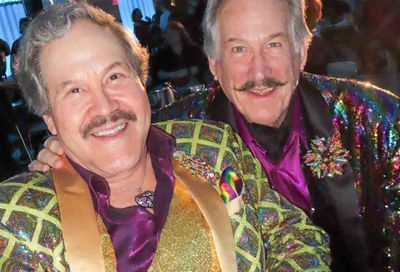Spectrum Shorts: Gender, Identity and Aging
Reel Affirmations 2016
Saturday, Oct. 15
1 p.m.
GALA’s Tivoli Theatre
![]()
![]()
![]()
It seems a little heavy-handed to start with something called Dawn (![]()
![]()
![]() ), but this British short is certainly intriguing. Two strangers meet on a bench in London in the early hours of the morning, each nervous of the other’s presence — one is blind, one is transgender, neither is sure of how the other will react. Trans writer-director Jake Graf’s film is interesting, if a little too ambiguous, and — as the pair enjoy the warmth of the sunrise and slowly open up to one another — more than a few will groan as actress Nicole Gibson looks out into the distance, feeling rejuvenated emotionally, and tells Will (Harry Rundle) that her name is Dawn.
), but this British short is certainly intriguing. Two strangers meet on a bench in London in the early hours of the morning, each nervous of the other’s presence — one is blind, one is transgender, neither is sure of how the other will react. Trans writer-director Jake Graf’s film is interesting, if a little too ambiguous, and — as the pair enjoy the warmth of the sunrise and slowly open up to one another — more than a few will groan as actress Nicole Gibson looks out into the distance, feeling rejuvenated emotionally, and tells Will (Harry Rundle) that her name is Dawn.
This program focuses on gender and aging, and Partners (![]()
![]()
![]() ) tackles both in lighthearted fashion. Kate Imbach’s wafer-thin documentary visits several gay square dancing clubs, discovering that what was once a safe space and respite from the bar scene has transformed into a place for older LGBT people to let loose — and straight couples to come and mix up traditional gender roles. Inevitably, the program was also going showcase the hardships of growing old, and Elvis León’s documentary is a harsh reminder of the reality many face. Cecil & Carl (
) tackles both in lighthearted fashion. Kate Imbach’s wafer-thin documentary visits several gay square dancing clubs, discovering that what was once a safe space and respite from the bar scene has transformed into a place for older LGBT people to let loose — and straight couples to come and mix up traditional gender roles. Inevitably, the program was also going showcase the hardships of growing old, and Elvis León’s documentary is a harsh reminder of the reality many face. Cecil & Carl (![]()
![]()
![]()
![]() ) follows Cecil Bethea and Carl Shepherd, a couple separated, emotionally and later physically, by the advancement of age. Cecil lives in the home the couple shared for 43 years, while Carl is in a care facility, slowly succumbing to dementia. Cecil — still deeply in love — acknowledges that his partner is struggling to recognize him. “I no longer know how to communicate with him,” he says, eyes filling with tears. A later shot of Cecil, alone in an oversized home filled with memories and no one to share them with, breaks the heart. As Cecil writes at the film’s close, in the end they “remain just two old men waiting for God.”
) follows Cecil Bethea and Carl Shepherd, a couple separated, emotionally and later physically, by the advancement of age. Cecil lives in the home the couple shared for 43 years, while Carl is in a care facility, slowly succumbing to dementia. Cecil — still deeply in love — acknowledges that his partner is struggling to recognize him. “I no longer know how to communicate with him,” he says, eyes filling with tears. A later shot of Cecil, alone in an oversized home filled with memories and no one to share them with, breaks the heart. As Cecil writes at the film’s close, in the end they “remain just two old men waiting for God.”
Terrible title sequence (with a slightly less terrible justification later in the film) aside, Kristin Adair’s malefemale (![]()
![]()
![]() ) follows Frances Reed, who is gender non-conforming, as they navigate the realities of not fitting into society’s predetermined boxes. A snippet of insight into the mindset of someone who doesn’t identify with either gender, it’s bitesize, but compelling nonetheless.
) follows Frances Reed, who is gender non-conforming, as they navigate the realities of not fitting into society’s predetermined boxes. A snippet of insight into the mindset of someone who doesn’t identify with either gender, it’s bitesize, but compelling nonetheless.
Brazil has a problem with anti-LGBT violence and attitudes and Alexandre Nakahara wants everyone to know. Places of Fear and Hatred (![]()
![]()
![]()
![]() ) Is a half-hour of contrasts, but above all else it proves that discrimination knows no boundaries. From a jailed trans sex worker to an abused trans college student, an assaulted middle class gay man to a wrongly arrested trans male, no one is free from violence, abuse and the threat of retribution in a country that lacks federal antidiscrimination laws (just like America, before you feel too high-and-mighty while watching Nakahara’s documentary).
) Is a half-hour of contrasts, but above all else it proves that discrimination knows no boundaries. From a jailed trans sex worker to an abused trans college student, an assaulted middle class gay man to a wrongly arrested trans male, no one is free from violence, abuse and the threat of retribution in a country that lacks federal antidiscrimination laws (just like America, before you feel too high-and-mighty while watching Nakahara’s documentary).
Much like square dancing, community social groups offer a welcome lifeline to many elderly LGBT people. Aaron Koehler’s An Afternoon Knows (![]()
![]()
![]() ) is another sliver of a documentary about two elders who participate in social groups in Denver, Colorado, and is a reminder that, regardless of age, LGBT people are always trying to find a sense of belonging.
) is another sliver of a documentary about two elders who participate in social groups in Denver, Colorado, and is a reminder that, regardless of age, LGBT people are always trying to find a sense of belonging.
Half of First Night Out‘s (![]()
![]() ) two-minute runtime is credits. A tiny short about a trans woman having dinner out for the first time, it comes and goes before you’ll have time to get invested. It offers a breather before the wonderful These C*cksucking Tears (
) two-minute runtime is credits. A tiny short about a trans woman having dinner out for the first time, it comes and goes before you’ll have time to get invested. It offers a breather before the wonderful These C*cksucking Tears (![]()
![]()
![]()
![]() ). Not just an amusing title, it’s also the name of a song from Lavender Country, the first gay-themed album in country music history, released by Pat Haggerty and his bandmates in 1973. They were subsequently shut out of Nashville and he became an activist, fighting for equality. Dan Taberski’s fascinating documentary catches up with Haggerty as Lavender Country enjoys a resurgence in popularity, offering a compelling glimpse into the septuagenarian’s life as he heads out on tour for the first time in four decades.
). Not just an amusing title, it’s also the name of a song from Lavender Country, the first gay-themed album in country music history, released by Pat Haggerty and his bandmates in 1973. They were subsequently shut out of Nashville and he became an activist, fighting for equality. Dan Taberski’s fascinating documentary catches up with Haggerty as Lavender Country enjoys a resurgence in popularity, offering a compelling glimpse into the septuagenarian’s life as he heads out on tour for the first time in four decades.
Support Metro Weekly’s Journalism
These are challenging times for news organizations. And yet it’s crucial we stay active and provide vital resources and information to both our local readers and the world. So won’t you please take a moment and consider supporting Metro Weekly with a membership? For as little as $5 a month, you can help ensure Metro Weekly magazine and MetroWeekly.com remain free, viable resources as we provide the best, most diverse, culturally-resonant LGBTQ coverage in both the D.C. region and around the world. Memberships come with exclusive perks and discounts, your own personal digital delivery of each week’s magazine (and an archive), access to our Member's Lounge when it launches this fall, and exclusive members-only items like Metro Weekly Membership Mugs and Tote Bags! Check out all our membership levels here and please join us today!



















You must be logged in to post a comment.